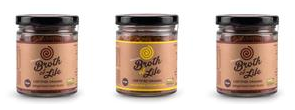
Written by Alison Bell
Gut health. It's at the top of everyone's list today as the cause behind so many ailments. It seems to be the latest buzz word and is becoming quite the epidemic! But how do you know if you have a leaky gut? And how did you get one? And what is it anyway???
What is a Leaky Gut?
 The official definition of a leaky gut is "Intestinal Permeability". So what's that? Our intestine wall is permeable, meaning it allows fluids and gases to pass through. When we have a leaky gut, there may be a hole in the permeable lining allowing all kinds of fluids to pass through, both the good, the bad and the ugly!
The official definition of a leaky gut is "Intestinal Permeability". So what's that? Our intestine wall is permeable, meaning it allows fluids and gases to pass through. When we have a leaky gut, there may be a hole in the permeable lining allowing all kinds of fluids to pass through, both the good, the bad and the ugly!
It's easiest to think of the gut like a fly screen. All those little fine holes allows air to pass through but keeps the nasty bugs out. If the hole were to expand in one place, then the bugs would start making their way through the window. And as the hole gets bigger, then we get more and more bugs. Our gut lining is very similar. While the permeability is as it should be, all the good guys pass on through to our system. Once we get a bit of a hole, then a few of the nasty guys make their way into our system and we can start to feel sick, experiencing a leaky gut.
What caused my Leaky Gut?
 A leaky gut is generally caused by diet, infections, too many toxins, bacterial imbalance and stress.
A leaky gut is generally caused by diet, infections, too many toxins, bacterial imbalance and stress.
Some foods high on the list that can cause a leaky gut are gluten, soy, dairy, sugar and processed foods, which many people consume every day. Leaky gut may also be caused by antibiotics, steroids, pesticides and pain killers that inflame the intestinal lining and kill off the good bacteria in the gut.
Stress is another biggie for breaking the gut lining. Your body can detect when you are under stress and it creates a change in the microbiota. A usually harmless microbe will turn pathogenic in response to stress hormones that we release which throws the gut ecology out of balance.
Lastly dysbiosis must get a mention. This is the imablance between healthy bacteria in the gut, and the bad guys running loose harming your gut. This imbalance can start as early as birth by the mother not having a healthy gut bacteria herself, or by c-section births.
What are the Symptoms?
Symptoms of leaky gut will vary from person to person
- Gut Issues - gas, bloating, constipation, diarrhoea, cramping.
- Autoimmune disease: celiac, hashimotos, graves, fibromyalgia, arthritis, psoriasis, lupus, chron's...
- Mood and mind - moodiness, depression, anxiety, ADD, ADHD.
- Skin issues and rashes such as eczema, acne, rosacea.
- Food allergies and intolerance
- Joint pains
- Fatigue
- Hormonal imablances
- Excessive fatigue or chronic fatigue syndrome
- Brain fog, short term memory loss, headaches
How do I test my gut?
It's best to see an integrative doctor who can help assess all your symptoms. And it may also be a good idea to get a full gut analysis test such as those run by BioScreen. The results can be a bit complicated so you will need a medical practitioner to help understand the feedback.
How do I fix my gut?
The best place to start is by removing the bad things could be causing your leaky gut.
Revisit your diet and see if there are any items that your body may be treating as a toxin. Replace these with some foods that will help improve your gut health such as fermented foods and bone broths. Check in on your stress levels, assess any unnecessary medication and see if there is a natural alternative.
Bone broth contains collagen and amino acids that can help mend the damaged wall, much like spakfilla on a plasterboard wall. Kombucha, pastured kefir yoghurt, butter and raw cheese contain natural probiotics that can help rise the good guy numbers in your stomach. Coconut kefir and coconut products are also fabulous probiotics and are easier to digest than dairy products. Finding a good quality probiotic supplement is also very beneficial to help replenish the good bacteria in the gut. While it is helpful to remove all the bad guys, it is pointless if there aren't any good guys in the stomach, so a probiotic can be essential for this.
Lastly, I suggest finding a good integrative doctor to help you if you are having severe symptoms. While studies on the microbiome are relatively new, there is more and more evidence each day exactly how much our gut is responsible for. A good doctor can aid you with supplements and diet choices.
FURTHER READING:
Understanding Leaky Gut Syndrome
Leaky Gut - 4 Steps to Fix It
Show All




















